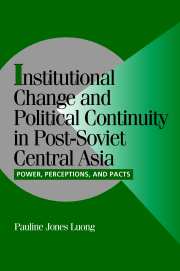 Institutional Change and Political Continuity in Post-Soviet Central Asia
Institutional Change and Political Continuity in Post-Soviet Central Asia Book contents
- Frontmatter
- Contents
- Tables and Figures
- Note on Transliteration
- Acronyms
- Acknowledgments
- 1 THE CONTINUITY OF CHANGE: OLD FORMULAS AND NEW INSTITUTIONS
- 2 EXPLAINING INSTITUTIONAL DESIGN IN TRANSITIONAL STATES: BEYOND STRUCTURE VERSUS AGENCY
- 3 SOURCES OF CONTINUITY: THE SOVIET LEGACY IN CENTRAL ASIA
- 4 SOURCES OF CHANGE: THE TRANSITIONAL CONTEXT IN CENTRAL ASIA
- 5 ESTABLISHING AN ELECTORAL SYSTEM IN KYRGYZSTAN: RISE OF THE REGIONS
- 6 ESTABLISHING AN ELECTORAL SYSTEM IN UZBEKISTAN: REVENGE OF THE CENTER
- 7 ESTABLISHING AN ELECTORAL SYSTEM IN KAZAKHSTAN: THE CENTER'S RISE AND THE REGIONS' REVENGE
- 8 INSTITUTIONAL CHANGE THROUGH CONTINUITY: SHIFTING POWER AND PROSPECTS FOR DEMOCRACY
- Appendix I Sample Interview Questions
- Appendix II Career Patterns of Regional Leaders in Soviet and Post-Soviet Central Asia
- References
- Index
6 - ESTABLISHING AN ELECTORAL SYSTEM IN UZBEKISTAN: REVENGE OF THE CENTER
Published online by Cambridge University Press: 02 September 2009
- Frontmatter
- Contents
- Tables and Figures
- Note on Transliteration
- Acronyms
- Acknowledgments
- 1 THE CONTINUITY OF CHANGE: OLD FORMULAS AND NEW INSTITUTIONS
- 2 EXPLAINING INSTITUTIONAL DESIGN IN TRANSITIONAL STATES: BEYOND STRUCTURE VERSUS AGENCY
- 3 SOURCES OF CONTINUITY: THE SOVIET LEGACY IN CENTRAL ASIA
- 4 SOURCES OF CHANGE: THE TRANSITIONAL CONTEXT IN CENTRAL ASIA
- 5 ESTABLISHING AN ELECTORAL SYSTEM IN KYRGYZSTAN: RISE OF THE REGIONS
- 6 ESTABLISHING AN ELECTORAL SYSTEM IN UZBEKISTAN: REVENGE OF THE CENTER
- 7 ESTABLISHING AN ELECTORAL SYSTEM IN KAZAKHSTAN: THE CENTER'S RISE AND THE REGIONS' REVENGE
- 8 INSTITUTIONAL CHANGE THROUGH CONTINUITY: SHIFTING POWER AND PROSPECTS FOR DEMOCRACY
- Appendix I Sample Interview Questions
- Appendix II Career Patterns of Regional Leaders in Soviet and Post-Soviet Central Asia
- References
- Index
Summary
In the spring of 1993, President Islam Karimov announced that the existing electoral system was “no longer appropriate for independent Uzbekistan.” The reaction to this declaration was stark in comparison to neighboring Kyrgyzstan. Supreme Soviet deputies, including the regional leaders among them, showed little, if any, resistance to either holding early elections to establish a new parliament or adopting a new electoral law. Rather, many of them viewed these events as a fait accompli, which they were better off accepting than fighting. “The sooner discussions about a new electoral law began,” they reasoned, “the greater the guarantee” that they would participate in crafting these new rules. In fact, the first official impetus for changing the existing electoral law came from among regional leaders within the Supreme Soviet – in anticipation of the central government's intentions to do the same. In May 1993, the Supreme Soviet passed a resolution to establish a working group to prepare a draft electoral law. Meanwhile, a parallel committee was formed within the presidential apparat.
The series of events that followed also represent a stark contrast to Kyrgyzstan's experience. Negotiations began shortly thereafter and, by August 1993, the presidential committee had already produced a draft electoral law, which it then submitted to the Supreme Soviet at the opening of its Thirteenth Session on September 3, 1993. Just three months later – on December 28, 1993 – the Supreme Soviet unanimously adopted this draft as the new electoral law with only a few minor changes.
- Type
- Chapter
- Information
- Institutional Change and Political Continuity in Post-Soviet Central AsiaPower, Perceptions, and Pacts, pp. 189 - 212Publisher: Cambridge University PressPrint publication year: 2002


